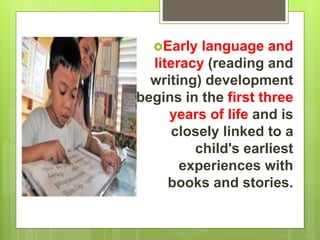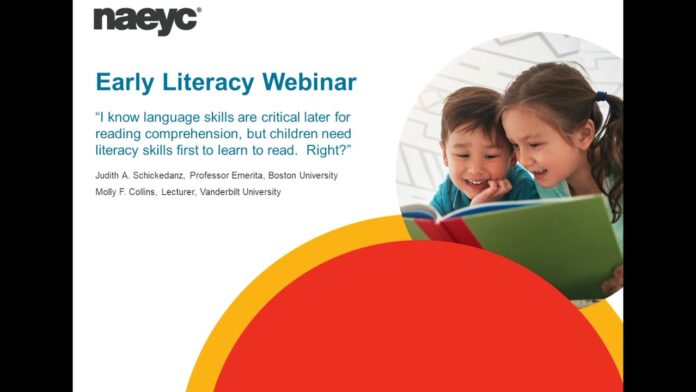With the increasing availability and accessibility of online education, it has become an important tool for students to continue their learning journey. However, this shift to virtual classrooms has also posed challenges, particularly in the areas of language and literacy. In this blog post, we will explore the importance of language and literacy in online learning and discuss strategies for overcoming these challenges. We will also look at the impact of digital literacy on learning outcomes and examine case studies of successful language integration in online education. Finally, we will discuss future trends in language and literacy education in the virtual world.
Importance of Language and Literacy in Online Learning
Language and literacy are essential skills for success in any form of education. In the context of online learning, they become even more crucial as students need to navigate through digital platforms and communicate effectively in a virtual environment. Here, let us take a closer look at why language and literacy are vital in online education.
Communication and Collaboration
In any type of learning, effective communication is key to understanding and retaining information. In traditional classrooms, students have face-to-face interactions with their teachers and peers, which can help them clarify doubts and engage in discussions. However, in online education, communication primarily takes place through written text, making language and literacy skills essential for effective collaboration.
Moreover, online learning often involves group projects and assignments, requiring students to coordinate and work together towards a common goal. This necessitates the use of proper language, tone, and structure to convey ideas and contribute to the group’s work. Without strong language and literacy skills, students may struggle to communicate their thoughts and ideas, hindering the collaborative process.
Understanding Course Materials
In online education, students are expected to independently navigate through course materials, such as videos, presentations, and readings. This requires a high level of reading and comprehension skills, as well as the ability to interpret and analyze information. Without a strong foundation in language and literacy, students may struggle to understand the course materials, leading to difficulties in completing assignments and grasping concepts.
Digital Literacy
In addition to traditional language and literacy skills, online education also requires digital literacy. This includes the ability to effectively use technology and navigate through different digital platforms. Without digital literacy skills, students may face difficulties in accessing and using course materials, submitting assignments, and participating in online discussions.
Technological Tools for Enhancing Language Skills

As mentioned earlier, online learning relies heavily on written communication. To overcome language barriers and enhance language skills, there are several technological tools that can be utilized.
Spelling and Grammar Checkers
Spelling and grammar checkers are useful tools for improving language skills in online education. These tools can help students identify and correct spelling and grammar errors in their written work, allowing them to improve their writing skills. Some popular spelling and grammar checkers include Grammarly and Hemingway Editor.
Translation Tools
For students who are not native English speakers, translation tools such as Google Translate can be helpful in understanding course materials and communicating with teachers and peers. These tools allow students to translate text from one language to another, helping them overcome language barriers in online education.
Digital Flashcards
Digital flashcard apps, such as Quizlet and Anki, can also aid in enhancing language skills. These apps allow students to create and study flashcards on their mobile devices, making it a convenient way to learn new vocabulary and improve language proficiency.
Strategies for Improving Literacy in Virtual Classrooms

Apart from technological tools, there are also various strategies that virtual classrooms can use to improve literacy skills among students. Let us explore some of these strategies.
Encourage Reading
Reading is an effective way to improve literacy skills, and virtual classrooms can encourage this by providing access to e-books and other digital reading materials. Teachers can also assign reading tasks and provide feedback on students’ reading skills.
Interactive Presentations
Interactive presentations, such as Prezi and Sway, can be used to engage students in the learning process while improving their literacy skills. These presentations allow for the integration of multimedia elements, making it easier for students to understand and retain information.
Collaborative Writing Tasks
Collaborative writing tasks, such as group essays or wikis, can help improve students’ writing skills while promoting collaboration. These tasks involve students working together to create written content, providing an opportunity for them to practice their writing skills and receive constructive feedback from peers.
Overcoming Language Barriers in Online Education
Language barriers can be a significant challenge for students in online education, particularly for non-native English speakers. However, there are strategies that virtual classrooms can use to overcome these barriers.
Provide Multilingual Resources
To cater to the needs of non-native English speakers, virtual classrooms can provide multilingual resources, such as translated course materials and instructional videos. This can help students better understand the content and participate in discussions.
Facilitate Peer-to-Peer Communication
Peer-to-peer communication can be beneficial for students who are struggling with language barriers. By allowing students to communicate with each other in their native languages, they can clarify doubts and collaborate more effectively.
Encourage Active Learning
Active learning methods, such as role-playing and simulations, can help students overcome language barriers by engaging them in hands-on activities. These methods encourage active participation and reduce the focus on language proficiency.
Impact of Digital Literacy on Learning Outcomes
In the digital age, being digitally literate is just as important as traditional literacy skills. Digital literacy refers to the ability to use technology effectively and ethically. In online education, digital literacy plays a crucial role in improving learning outcomes. Here’s how:
- Access to Information: With digital literacy, students can access a vast amount of information from various online sources. This allows them to gain a deeper understanding of concepts and improve their critical thinking skills.
- Collaboration: Digital literacy enables students to collaborate with their peers and teachers through different digital platforms, increasing their engagement and participation in the learning process.
- Self-directed Learning: With digital literacy skills, students can independently navigate through course materials and acquire new knowledge, fostering self-directed learning.
- Real-world Skills: As technology is constantly evolving, digital literacy prepares students for the real world, where digital skills are becoming increasingly essential.
Case Studies of Successful Language Integration Online
There have been several successful examples of integrating language and literacy skills into online education. Let us look at some case studies that highlight the impact of these strategies.
Duolingo
Duolingo is an online language learning platform that uses gamification to make learning a new language fun and engaging. The app offers courses in over 30 languages and has more than 300 million users worldwide. Its success lies in its use of game-like elements, such as points, levels, and rewards, to motivate students to continue learning.
National Geographic’s Educator Community
National Geographic’s Educator Community is an online platform that provides professional development for K-12 educators. One of its programs, “Learning English through Science,” uses multimedia resources, such as videos and articles, to help teachers integrate language and literacy skills into science lessons. The program has seen significant improvements in students’ language and literacy skills, as well as their understanding of scientific concepts.
Coursera
Coursera is a popular online learning platform that offers courses from top universities and organizations. One of its most successful initiatives is the “Global Translator Community” program, which utilizes volunteers to translate course materials into different languages. This has allowed for greater accessibility to online education for non-native English speakers and has seen a significant increase in course completion rates.
Future Trends in Language and Literacy Education
As online education continues to evolve, there are several trends that we can expect to see in the area of language and literacy education. These include:
- Artificial Intelligence (AI) Tools: With advancements in AI technology, we can expect to see more AI-powered tools that can help improve language and literacy skills.
- Virtual Reality (VR): VR technology can provide a more immersive learning experience and can be particularly useful for language learning.
- Personalized Learning: With the use of data-driven tools and algorithms, personalized learning can cater to individual students’ needs, including their language and literacy proficiency levels.
- Collaboration with Native Speakers: As virtual classrooms continue to connect students from different parts of the world, we can expect to see more opportunities for peer-to-peer communication and collaboration, which can enhance language skills.
Conclusion
Language and literacy skills play a crucial role in the success of students in online education. By utilizing technological tools and implementing effective strategies, virtual classrooms can overcome language and literacy challenges and ensure that all students have equal opportunities to learn. As digital literacy becomes increasingly important, it is essential to continue integrating it into online education to prepare students for the future. With advancements in technology and innovative approaches, we can expect to see even more successful examples of language integration in online education in the years to come.
